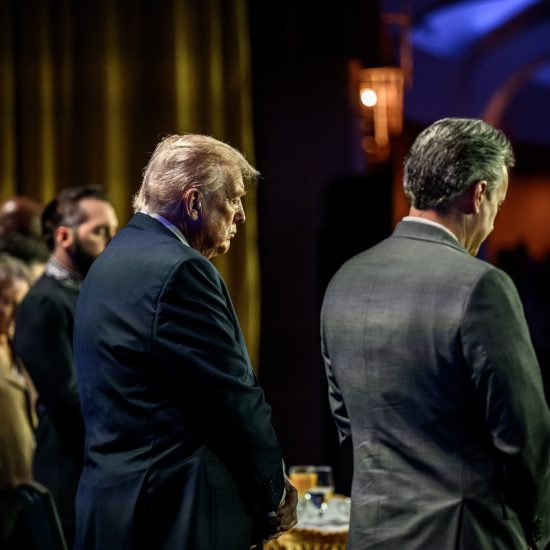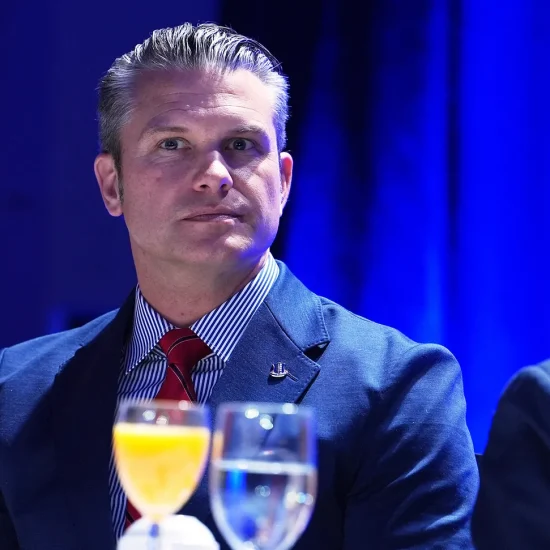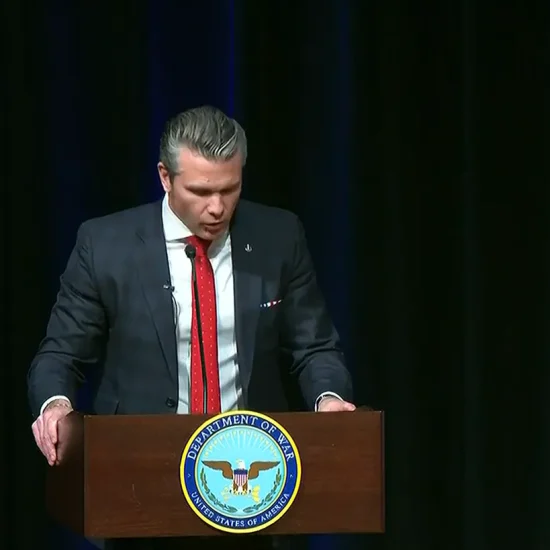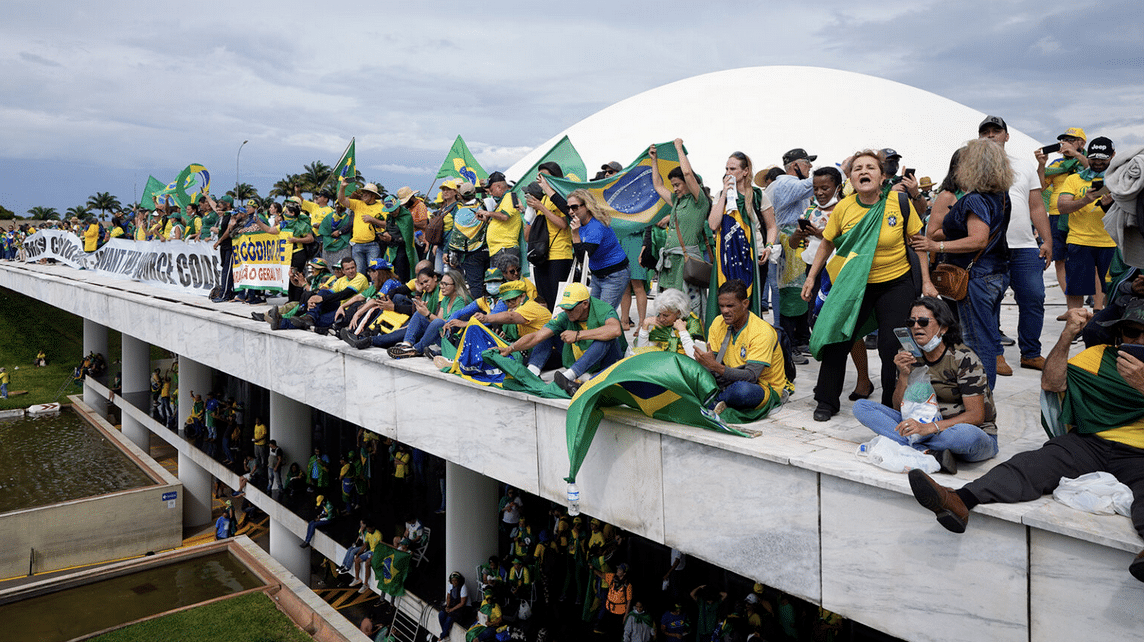
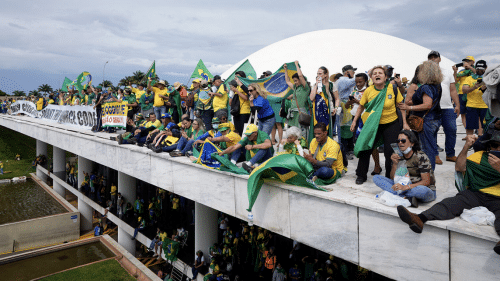
Supporters of Brazil’s former President Jair Bolsonaro stand on the roof of the National Congress building after they stormed it, in Brasilia, Brazil, Jan. 8, 2023. (AP Photo/Eraldo Peres)
SÃO PAULO (RNS) — The storming of the capital city of Brasília on Jan. 8 by thousands of supporters of Brazil’s former president, Jair Bolsonaro, not only left a trail of destruction, but demonstrated that a very well-organized segment of the country’s citizenry is willing to see a military dictatorship take power.
In the aftermath of the destructive riot, which has been likened to the Jan. 6, 2021, insurrection at the U.S. Capitol, President Luiz Inácio Lula da Silva’s administration has detained around 1,800 people who invaded government buildings.
Among those arrested were at least four evangelical pastors, according to Agência Pública, a Brazilian investigative news agency, which analyzed the government labor records of 1,398 detained demonstrators. The pastors were representative of the significant presence of evangelicals and Catholics among the mob.
It has become clear that hundreds of Christian organizations — neo-Pentecostal churches especially, but also Catholic groups — were involved with or had members take part in the attempted coup.
Numerous videos posted on social media showed rioters praying, shouting Christian slogans and singing gospel hymns as they stormed the capital buildings. In one of the clips that went viral on Brazilian social media, a group is seen at the Senate’s assembly room and one man shouts over and over again: “Brazil belongs to Lord Jesus! The Senate is our church! The Senate is the church of the people of God!”
“Those are people who think they are heroes, so they recorded their actions and showed their faces. They had a clear religious rhetoric. We can see them citing the Bible or speaking in tongues in different videos,” explained Vinicius do Valle, a political scientist who directs the Evangelical Observatory, a nongovernmental organization studying Christian churches in Brazil.
Do Valle argues that Bolsonaro created a political persona with religion as a central element.
“It is a kind of religiosity connected to conservative aspects of Christianity. That is why he was able to establish a deep alliance with evangelicals and conservative Catholics,” he added.
That alliance is here to stay, according to Priscilla dos Reis Ribeiro, a theologian and human rights activist in Rio de Janeiro.
“Social media groups have been disseminating disinformation to support Bolsonaro’s fascist administration for four years. The mentality created in that process will not suddenly disappear,” she told Religion News Service, noting that many conservatives believe Lula’s Workers’ Party is a communist force bent on destroying Christian churches.
Those fears have become so deeply rooted, according to Ribeiro, for some to believe their only hope is a military regime — that democracy is no longer strong enough to protect them or their churches.
“Those groups assumed a fundamentalist nature and believe in political violence,” Ribeiro warned.
A survey conducted by Atlas/Intel on Jan. 8 and 9 showed that 64% of evangelicals support a military coup in Brazil. Nearly a third (31%) support the capital invasion, compared with 18% of Brazilians overall. Only 28% of evangelicals believe Lula’s election was legitimate.
They contend that Lula — who had been in prison for corruption charges and was released and politically rehabilitated after the Supreme Court annulled his convictions — only won as a result of electoral fraud aimed at removing Bolsonaro from power.
Such conspiracies echo Bolsonaro’s own preemptive attacks of the Brazilian voting machines and his continuous threats to not recognize a Lula victory.
Then there are those who believe the Jan. 8 riots were carried out by militants of the Workes’ Party disguised as Bolsonaro supporters, according to Francisco Borba Ribeiro Neto, the director of the Pontifical Catholic University of São Paulo’s Center of Faith and Culture.
“Bolsonarism boosted a schizophrenic trend,” said Ribeiro Neto. “They are also convinced the left wing will force youngsters to become homosexuals and will shut down churches.”
That is a minority segment, Ribeiro Neto added. Nevertheless, it can influence broader groups and, at times, promote violence.
Evangelical pastor Toninho Graciano, a Christian leader in the city of Votuporanga, in São Paulo state, told RNS that a group of 30 or 40 people from churches in the city went to Brasília on Sunday. He also wanted to go, but he could not join them because he had to work.
“I am against that kind of action. That was an excess, something that got out of control. Videos will show more and more that there were infiltrated people there, people who already had the intention of perpetrating those acts. That kind of thing can damage the reputation of conservatism,” he told RNS.
Graciano acknowledged that many of the rioters “are sure that there has been electoral fraud.”
“One thing we can tell for sure: The president could not have been elected, given that he has a criminal record,” he added.
Graciano is part of the group that thinks “the establishment” acted on behalf of Lula.
“I respect the ideas of everybody, but I believe that there was a scheme (to free Lula and make him win the election). That was the only way of beating Bolsonaro,” he said.
Graciano also thinks the churches are strong enough now to avoid persecution in any regime, but he fears the left may advance legislation to curtail Christians’ rights.
“We hope that the evangelical Congress members we elected defend our rights and keep faithful to sound doctrine,” he said.
More than 100 members of the Chamber of Deputies — 20% of the total in the lower house of Congress — are part of the powerful evangelical bloc, which is expected to strongly oppose Lula’s administration.
One of its members is congressman Marco Feliciano, a famous evangelical pastor and politician in Brazil and a strong Bolsonaro ally.
“We, observant Christians who were side by side with President Bolsonaro, were not motivated by political factors, but by ideological ones, like the Judeo-Christian customs, the respect to property and, more important, the protection to traditional family and to life since conception,” he told RNS, adding that such values “are nonnegotiable.”
Feliciano rejects any notion that the evangelical bloc of Congress would cooperate with Lula’s administration.
“Those who are close to Lula are Christians fabricated in the Soviet Union who deny traditional values. They want a totalitarian regime in soft colors and a ‘god’ moldable to their interests,” Feliciano said.
Pastor Romi Bencke, who heads the National Council of Christian Churches, believes Brazil is in a dangerous moment and hopes religious institutions understand the severity of the situation and will unify to take anti-violence measures.
“A strong attitude is needed to reaffirm Christian principles and call out the ministers who have been accompanying those extremist groups. Otherwise, they will maintain their legitimacy,” Bencke said.
For Priscilla Ribeiro, that will require something of a reeducation.
“The far right has employed a rhetoric of morality to persuade those people. We have to emphasize social care and solidarity in our dialogue with them,” she concluded.



